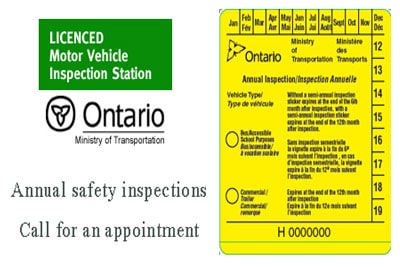
Are you a recreational boater who is unsure of the whole “do I need an annual inspection sticker for my truck and trailer”, do I need one for my personal use dump trailer or enclosed trailer?
Are you a small business owner who has a trailer that you use for business purposes or even for personal use and have that same question of do I need an annual Inspection or semiannual inspection sticker.
Heck, I have a personal use trailer and if I need an Annual Inspection Sticker do I also require a CVOR? Do I need to keep a daily log to haul my boat or trailer?
The rules around these topics, although having been around for quite some time, are confusing to most and in many cases are misunderstood.
Our friends at the Ministry of Transportation in Ontario have publicized the rules online which I will list below this article, but I will provide a “Coles Notes version” to try and clarify these mysterious rules….
Annual Inspections
Do I need as a recreational boater or a small business owner who hauls a small work trailer, have to have an Annual Inspection Sticker for my truck and trailer?
We first need to identify the weights of your truck and trailer. Now bear with me as this will be somewhat convoluted but I will give you a clearer picture at the end.
Now specifically for your truck, there are several weights that the MTO and Law Enforcement can use to determine this as per the regulations of the Highway Traffic Act in Ontario.
The rules around these inspections are based on commercial motor vehicles…
For the purposes of the annual Inspections, a pick up truck is classed as a commercial motor vehicle.
The MTO indicated the below:
A commercial motor vehicle is:
a truck or highway tractor with a gross weight or registered gross weight of more than 4,500 kilograms (kg)
OR
a bus with a seating capacity for ten or more passengers (we wont comment on busses in this article)
Annual and semi-annual inspections
An annual inspection is valid for 12 months.
Trucks, trailers and converter dollies, alone or in combination, with a total gross weight, registered gross weight or manufacturer’s gross vehicle weight rating of more than 4,500 kg require an annual inspection.
Total gross weight: the weight transmitted to the highway by the truck and/or trailer – includes the driver, passenger, fuel, equipment, tools, cargo, etc. carried by the truck and/or trailer
Registered gross weight (RGW): the maximum weight based on the fees paid for the truck licence plates – indicated in kilograms on the right (plate) portion of a truck’s ownership next to “REG. GROSS WT.” (trailers and converter dollies do not have a RGW)
Manufacturer’s gross vehicle weight rating (MGVWR): the maximum weight a truck is safely capable of weighing as declared by the manufacturer – indicated on the vehicle’s vehicle identification number (VIN) plate
The only safe way to know this is to get your vehicle weighed, as well as your fully loaded trailer, whether it be a boat and trailer or a boxed trailer.
Several of your area truck stops have certified scales that you can use for a small fee to determine these weights or some scrap yards might permit you to use their scales for this purpose for a small fee.
It is the recommendation that you weight your truck with what ever maximum weight that you would be hauling… people, materials in the bed, full tank of gas (that stuff weighs a bunch… ex 50 litres of gasoline is approx. 80 lbs or 36 kgs) etc.… you get the idea.
Whatever you would be hauling if you’re off to the lake or cottage and get pulled over to check to see if you have your UpToDate Annual Inspection Sticker.
This link will take you to an online calculator for fuel weight calculations.
Weigh the truck only, with the trailer attached.
Illustration One – Weighing a truck only – Weight A
Weigh the trailer only, with the trailer attached to the truck.
Illustration Two – Weighing a trailer only – Weight B
Ministry of Transportation of Ontario, Commercial Vehicle FAQ, © QUEEN’S PRINTER FOR ONTARIO, 2009 TERMS OF USE Last Modified date: June 27, 2017, http://www.mto.gov.on.ca/english/trucks/commercial-vehicle-faq.shtml
So, once you have your actual weights, check and see which weight is greater… the one you just received at the scale or what your RGW or MGVWR indicates…. Use this weight and add it to the actual weight of your boat and trailer.
If these weights are more than 4500 kgs or 9920.8 lbs., then both your truck and trailer will need to have the Annual Inspections completed.
These rules apply to everyone… not just commercial companies….
Well, now that you have determined that you need to have Annual Inspection stickers on both your truck and trailer were all good right….
WAIT… nope not quite…
We have that pesky thing called Registered gross weight (RGW) that we need to consider…
This RGW refers to what you have listed your vehicles registered weight as on your ownership…
We now must look at what our total weight of our loaded trailer:
If the trailer weighs more than 2,800 kg (6,171 lb.):
register the truck for at least the combined weight of the truck and trailer, weights A and B as noted in the diagram above.
If the trailer weighs 2,800 kg (6,171 lb.) or less:
register the truck for at least the weight of the truck (weight A), which includes trailer tongue weight
weight transmitted directly to the ground by the trailer is not included in the RGW
Ministry of Transportation of Ontario, Commercial Vehicle FAQ, © QUEEN’S PRINTER FOR ONTARIO, 2009 TERMS OF USE Last Modified date: June 27, 2017, http://www.mto.gov.on.ca/english/trucks/commercial-vehicle-faq.shtml
There are hefty fines in Ontario should you not have your vehicle registered properly so check your calculations and err on the side of caution when registering your vehicles.
You may think your good to go now that you have your truck and trailer properly registered, you have your nice yellow Annual Inspection Sticker affixed to the lower left portion of your trucks window and you have the other on the front left of your trailer…..
Here’s another oh wait moment….CVOR and daily Inspection records…..
CVOR requirements:
Now our commercial friends… those who make money or get compensation in any form… they have to abide by all these rules, but do we as recreation boaters or my hauling my personal dump trailer (I just had to use the one that my cousin has to do some well needed yard work)
Well the good news is that no we don’t… we do however we need to understand the rules…
According to the MTO’s website
Who needs a CVOR certificate?
Operators of trucks and buses plated in Ontario, the US or Mexico require a CVOR.
These vehicles include:
trucks with a gross weight or registered gross weight over 4,500 kg
buses with a seating capacity of 10 or more passengers
tow trucks – regardless of gross weight or registered gross weight
Vehicles plated in other Canadian provinces or territories don’t need a CVOR certificate. They require a safety fitness certificate from the province or territory in which the vehicle is plated.
It would appear that if we have had to increase the RGW of our truck as our trailer weight is greater than 2800kgs and that that RGW is now in excess of 4500 kgs then we would need to have a CVOR and follow all the applicable rules associated to that.
The good news is that no we do not, as long as the MGVWR weight is within the guidelines below.
Again, from the Ministry of Transportation of Ontario’s website
Operators that don’t need a CVOR certificate
Carriers that operate certain types of vehicles do not need a CVOR certificate. These vehicles include:
truck or buses plated in another Canadian province or territory
trucks with registered gross weight and gross weight of 4,500 kg or less, whether towing a trailer or not
trucks or buses leased by an individual for 30 days or less to move personal goods or to carry passengers at no fare
ambulances, fire trucks, hearses, casket wagons, mobile cranes
unladen trucks or buses operating under the authority of dealer plates or in-transit permits
buses used for personal purposes without compensation
motor homes used for personal purposes
pickup trucks that:
have a manufacturer’s gross vehicle weight rating of 6,000 kg (13,227 lb)
are being used for personal purposes without compensation
are fitted with either the original, unmodified box installed by the manufacturer, or an unmodified replacement box that duplicates the one installed by the manufacturer
are not carrying or towing a trailer carrying commercial cargo or tools, or equipment of any type normally used for commercial purposes
Ministry of Transportation of Ontario, Commercial Vehicle FAQ, © QUEEN’S PRINTER FOR ONTARIO, 2009 TERMS OF USE Last Modified date: June 27, 2017, http://www.mto.gov.on.ca/english/trucks/commercial-vehicle-operators-registration.shtml
This is the personal use exemption for CVOR. It is important to note that the definition for pickup trucks above uses the MGVWR not the RGW or Actual Weight in its definition.
So, as long as you are following the rules as listed above, you do not require a CVOR.
You should go to service Ontario however and request to get the CVOR personal exemption sticker that you can affix to your black commercial truck plate which will show the MTO enforcement officers and or Law Enforcement officer that you are properly licensed and registered.
Daily Inspections and Logs for personal use applications:
ONTARIO REGULATION 199/07 – COMMERCIAL MOTOR VEHICLE INSPECTIONS
This regulation of the Highway Traffic act covers the are that includes the need for Commercial Motor Vehicles to conduct daily inspections and the rules surrounding this.
Now based on section 1 (1)(G) of this Regulation, pickup trucks are exempt from the definition of Commercial Motor Vehicle for the purpose of this Regulation.
As such there is not a legal requirement to keep a daily log as would be the case if you were operating as a commercial for higher boat hauler or a commercial business who uses a pick-up to haul around a class of trailer which places you into the need of a CVOR.
It is still obviously a very good and recommended practice to always check your functioning lights, connection points to your truck as well as any tie downs each time you go to move your truck and trailer, even if you just stopped for lunch.
As a recreational boater, or for that matter anyone who is towing a trailer I hope that you have found this information informative.
As with any information of this type, it is only as good as the time when it was written and for the jurisdiction in which is was written for, in this case the Province of Ontario Canada.
As such, please always confirm with your local Highway Traffic authority for the Rules and Regulations which govern your particular area.
Helpful Links:
Commercial vehicles home
Commercial vehicle Frequently Asked Questions
Ontario Regulation 199/07 Commercial Motor Vehicle Inspections
